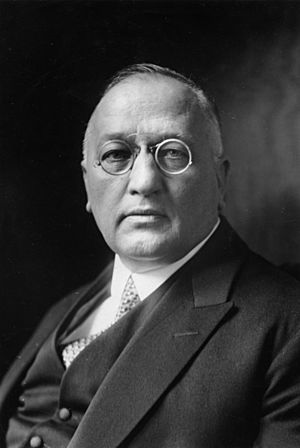Anton Korošec facts for kids
Quick facts for kids
Anton Korošec
|
|
|---|---|
 |
|
| 7th Prime Minister of Yugoslavia | |
| In office 28 July 1928 – 7 January 1929 |
|
| Monarch | Alexander I |
| Preceded by | Velimir Vukićević |
| Succeeded by | Petar Živković |
| President of the National Council of the State of Slovenes, Croats and Serbs |
|
| In office 29 October 1918 – 1 December 1918 |
|
| Deputy | Ante Pavelić Svetozar Pribićević |
| Preceded by | Office established |
| Succeeded by | Office abolished |
| Personal details | |
| Born | 12 May 1872 Biserjane, Styria, Austria-Hungary (now Slovenia) |
| Died | 14 December 1940 (aged 68) Belgrade, Yugoslavia (now Serbia) |
| Citizenship | Yugoslav |
| Political party | Slovene People's Party |
Anton Korošec (1872–1940) was an important politician in Yugoslavia. He was a member of the conservative People's Party and also a Roman Catholic priest. Korošec was known for his speeches and played a big role in the history of the South Slavs.
Contents
Early Life and Education
Anton Korošec was born on May 12, 1872, in a place called Biserjane. This area was then part of Austria-Hungary, but it is now in Slovenia.
He went to school in Ptuj and Maribor. Later, he studied theology, which is the study of religious faith. In 1895, he became a priest. He continued his studies and earned a special degree in theology from the University of Graz in 1905. During his studies, he became friends with Janez Evangelist Krek and was influenced by his political ideas.
Political Career
Joining Politics
In 1907, Korošec was elected to the Reichsrat. This was like the parliament of the Austro-Hungarian Empire. He was a member of the Slovenian People's Party. As the leader of the "Yugoslav Club" in the parliament, he read out the May Declaration. This declaration asked for all South Slavs (people like Slovenes, Croats, and Serbs) to be united in one state within the Austro-Hungarian Empire.
Forming a New State
After Austria-Hungary broke apart, Korošec became the president of the National Council of Slovenes, Croats and Serbs. On October 29, 1918, this council announced the creation of the State of Slovenes, Croats and Serbs.
Before this, Korošec and Nikola Pašić, a Serbian politician, had agreed on something called the Geneva Declaration. This agreement said that if the new state joined with the Kingdom of Serbia, all parts of the new state would have equal rights. However, the Serbs wanted a strong central government. So, the new country, which later became the Kingdom of Serbs, Croats and Slovenes, was a single, united monarchy.
Roles in Government
In 1918, Korošec became the vice-president in the first government of the new Kingdom of Serbs, Croats and Slovenes. As the leader of the Slovenian People's Party, he worked with other right-leaning governments.
Even though his party lost in 1920, they won again in Slovenia in 1924. Korošec was then chosen to be the vice-president of the government once more. He also served as the minister for the interior in 1924 and 1927.
Korošec did not agree with the Vidovdan Constitution. He wanted more independence for Slovenes within the Kingdom. But later, his party joined with Serbian politicians to form a central government, and the idea of more independence was put aside.
Prime Minister and Later Years
In 1928, after a politician named Stjepan Radić was killed, the king asked Korošec to lead the government. This was the first time a non-Serbian was Prime Minister of Yugoslavia. However, the king soon removed him when a new, stricter rule called the January 6th Dictatorship began. Korošec was also a minister in another government in 1929. He tried to solve the country's problems peacefully, but that government also fell in 1930.
When he was not in power, Korošec wrote the "Slovenian Declaration." This paper suggested a new union of Slovenes, Croats, and Serbs. This idea was popular with Slovenes living in nearby regions. In 1933, Korošec was sent away to the island of Hvar. His party then decided not to take part in the 1935 elections.
Despite this, Korošec was named minister for the interior again in 1935. He helped to arrange an important agreement between two politicians, Dragiša Cvetković and Vladko Maček. He then became the minister for education in their government. While in government, Korošec supported having close ties with Nazi Germany.
In October 1940, as education minister, Korošec introduced laws that limited the participation of Jewish people in certain businesses and restricted the number of Jewish students in schools and universities. When other ministers disagreed, Korošec said that not passing these laws would harm relations with Germany, so the laws were accepted.
Towards the end of his life, he spoke out against certain groups and ideas. He also helped create an organization called Straža v viharju (meaning "Sentinel in the Tempest"), which was against Communism.
Death
Anton Korošec passed away on December 14, 1940, at the age of 68. He died in Belgrade, which was then part of Kingdom of Yugoslavia and is now in Serbia.
See also
 In Spanish: Anton Korošec para niños
In Spanish: Anton Korošec para niños
 | Misty Copeland |
 | Raven Wilkinson |
 | Debra Austin |
 | Aesha Ash |

